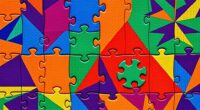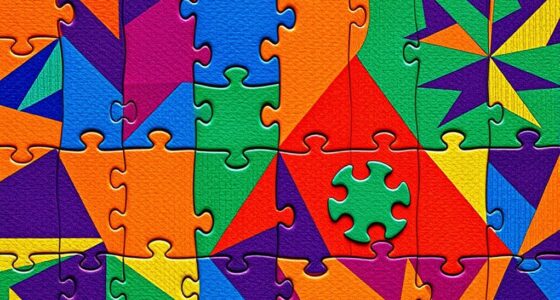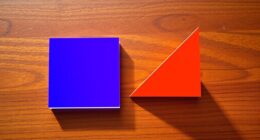If you’re looking for the best math puzzle books to challenge your mind and improve your reasoning skills, I suggest exploring options like “300+ Mathematical Pattern Puzzles” for pattern recognition, and “Brainteasers and Riddles for Gritty Kids” for family fun. For those wanting more advanced challenges, “Tricky Logic Puzzles for Adults” or “Mind Matrix” are great picks. Keep exploring, and you’ll discover even more engaging ways to boost your brainpower.
Key Takeaways
- These books offer diverse puzzles like logic, pattern recognition, and math challenges to stimulate critical thinking and problem-solving skills.
- They cater to all ages and skill levels, from beginners to advanced learners, ensuring gradual difficulty progression.
- Features include clear explanations, answer keys, and engaging formats to enhance learning and maintain motivation.
- High-quality design, colorful visuals, and varied puzzle types make learning math fun and accessible.
- They promote mental agility, boost brainpower, and are suitable for self-study, family activities, or classroom use.
300+ Mathematical Pattern Puzzles Book: Number Pattern Recognition & Reasoning
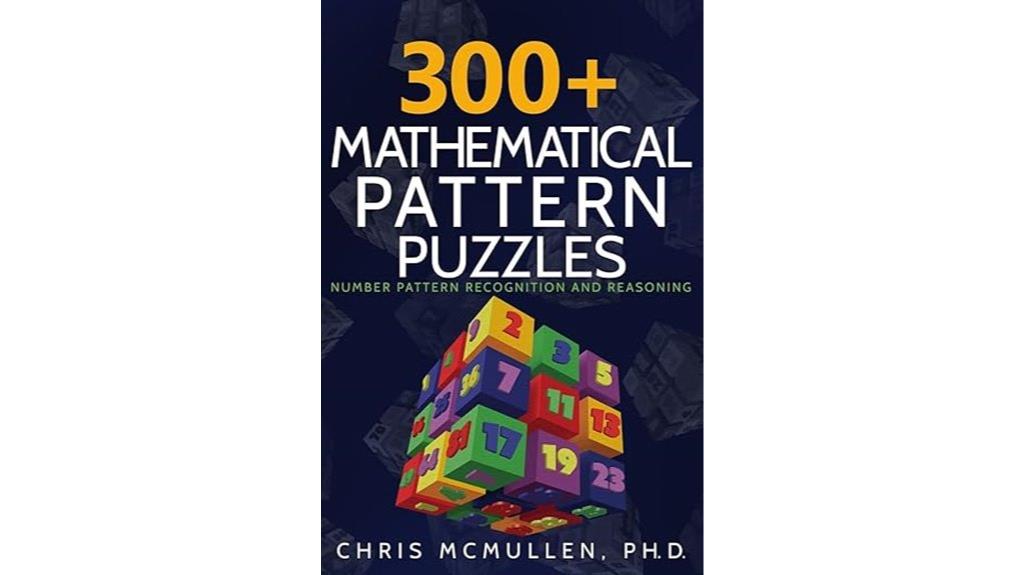
If you’re looking for a book that makes pattern recognition both fun and accessible, “300+ Mathematical Pattern Puzzles” is an excellent choice for beginners and casual math enthusiasts. I found it to be a great mental refresher, especially after long days, as it offers a satisfying challenge. The puzzles are engaging, sometimes tricky, but always rewarding once solved. I’ve enjoyed using it with friends and family, making game nights more interactive and brain-boosting. The clear structure and gradual difficulty increase make it perfect for learning, whether you’re preparing for exams or just want a fun way to sharpen your logical thinking skills.
Best For: beginners, casual math enthusiasts, and families seeking engaging pattern recognition puzzles for mental exercise and learning.
Pros:
- Clear explanations and structured progression make it accessible for learners
- Engaging puzzles that are fun, challenging, and rewarding to solve
- Suitable for all skill levels, from beginners to casual math lovers
Cons:
- Some puzzles may lack sufficient difficulty for advanced problem solvers
- Answers are only provided at the end of the book, not after each chapter
- Occasional usability issues, such as puzzles not varying in difficulty or interface annoyances
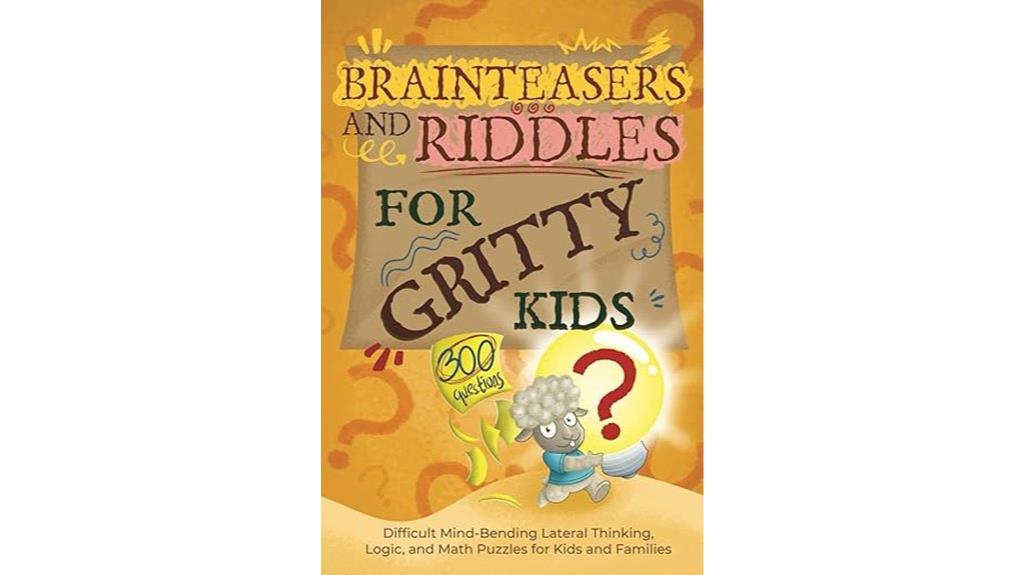
Brainteasers and Riddles for Gritty Kids: 300 Difficult Puzzles for Kids and Families stands out as an excellent choice for parents and grandparents seeking challenging, engaging activities that foster critical thinking. This book offers a diverse collection of tough puzzles that sharpen logic, lateral thinking, and problem-solving skills. Its high-quality design makes it a valuable investment in children’s mental development. Families love solving these puzzles together, often enjoying the thrill of “just one more.” Kids stay entertained and motivated, while reading puzzles aloud encourages shared learning. Overall, it’s a fun, educational resource that promotes critical thinking and strengthens family bonds.
Best For: parents, grandparents, and educators seeking a challenging and engaging way to boost children’s critical thinking and problem-solving skills through fun family activities.
Pros:
- Offers a large variety of 300 difficult puzzles to keep children engaged for hours.
- High-quality design makes it a durable and worthwhile investment in children’s mental development.
- Encourages family bonding through shared puzzle-solving experiences and reading aloud.
Cons:
- The difficulty level may be too challenging for very young children or beginners.
- Some users might find the puzzles too tough, potentially causing frustration.
- It may require adult supervision or assistance for certain puzzles to ensure understanding.
The Comedy of Numbers: Math Challenges Workbook
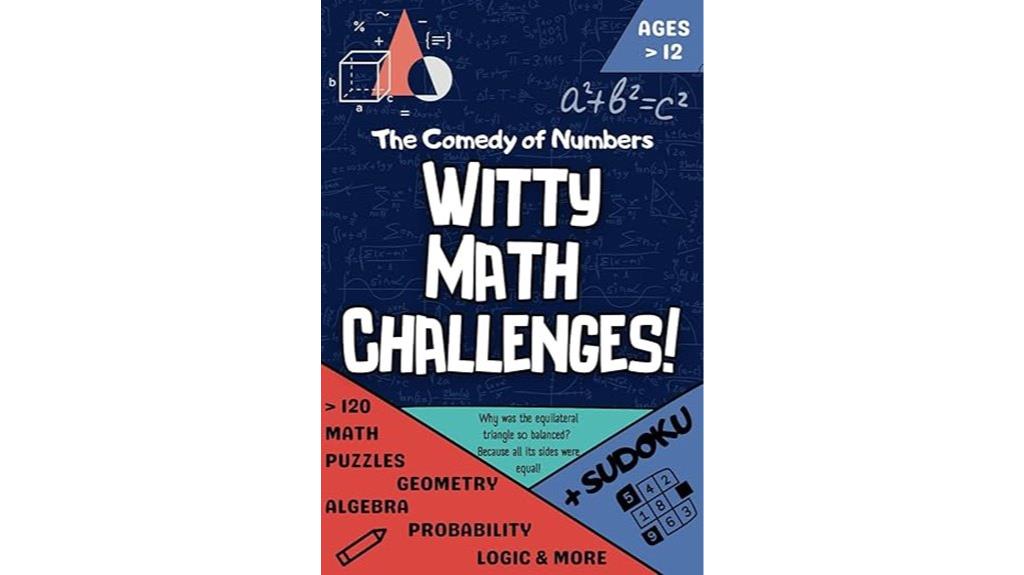
The Comedy of Numbers: Math Challenges Workbook stands out as an excellent choice for anyone aged 12 and up who wants to make math fun and engaging. With over 120 puzzles covering algebra, geometry, probability, logic, and Sudoku, it appeals to a wide audience—from kids to adults. The book combines a variety of challenges presented in a fresh, structured way that balances practice and entertainment. Its witty humor, dad jokes, and quirky problems turn math into a game, keeping motivation high. Designed to boost confidence and mental agility, it’s perfect for use at home, in class, or on the go.
Best For: learners aged 12 and up who want to make math fun, engaging, and accessible through a variety of puzzles and humor.
Pros:
- Offers over 120 diverse puzzles across algebra, geometry, probability, logic, and Sudoku, providing comprehensive practice.
- Uses witty humor, dad jokes, and quirky challenges to make math enjoyable and motivate sustained engagement.
- Suitable for all skill levels and ideal for use at home, in classrooms, or during travel to promote confidence and mental agility.
Cons:
- Some users might find certain puzzles too challenging or too easy depending on their skill level.
- The humor style may not appeal to everyone, especially those who prefer straightforward learning methods.
- As a workbook, it may require self-motivation, which could be a challenge for some learners without additional guidance.
300 Math Crossword Puzzles for Kids & Adults
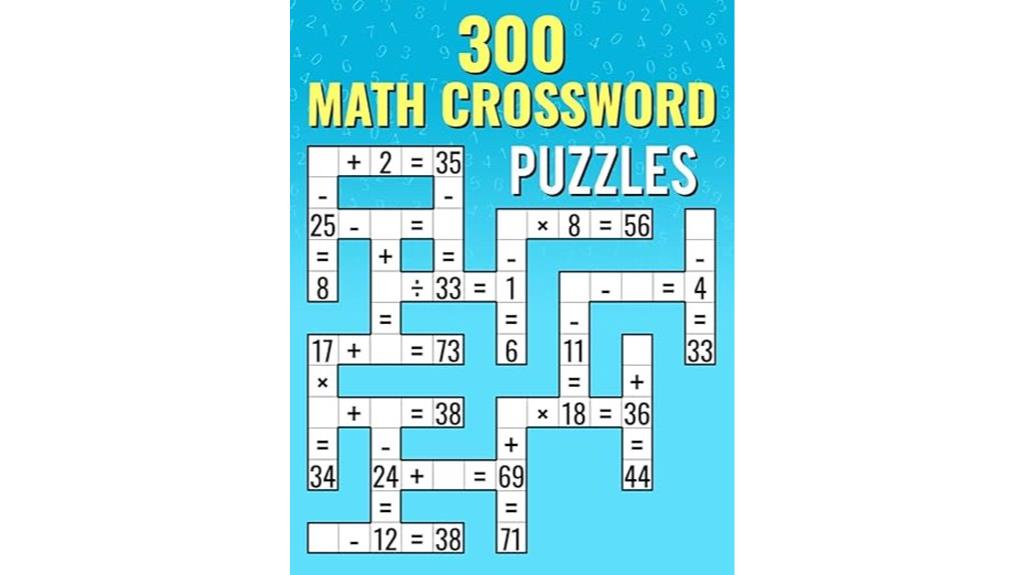
Looking for a fun way to boost math skills for both kids and adults? Math crossword puzzles are perfect! With 300 puzzles covering addition, subtraction, multiplication, and division, this book offers engaging challenges for all ages. The paper design makes erasing mistakes easy, and the puzzles gradually increase in difficulty, keeping you motivated. Kids around six can start improving their math, while adults stay sharp. Many users praise the quality and enjoy solving puzzles together, making learning interactive and enjoyable. Whether during trips or at home, these puzzles boost confidence and strengthen math skills in a fun, bonding way.
Best For: parents, teachers, and learners of all ages seeking an engaging and educational way to improve math skills through fun crossword puzzles.
Pros:
- Provides a wide range of puzzles covering basic to advanced math concepts
- Promotes active learning and confidence in math skills
- Durable paper design allows easy correction of mistakes
Cons:
- Slightly tight binding may make puzzles in the middle difficult to view
- Some puzzles may be too simple initially, requiring more challenging options for advanced users
- Puzzles may need to be more progressively difficult to maintain high engagement for experienced solvers
Do the Math!: Challenging, Fun Math Puzzles for Kids
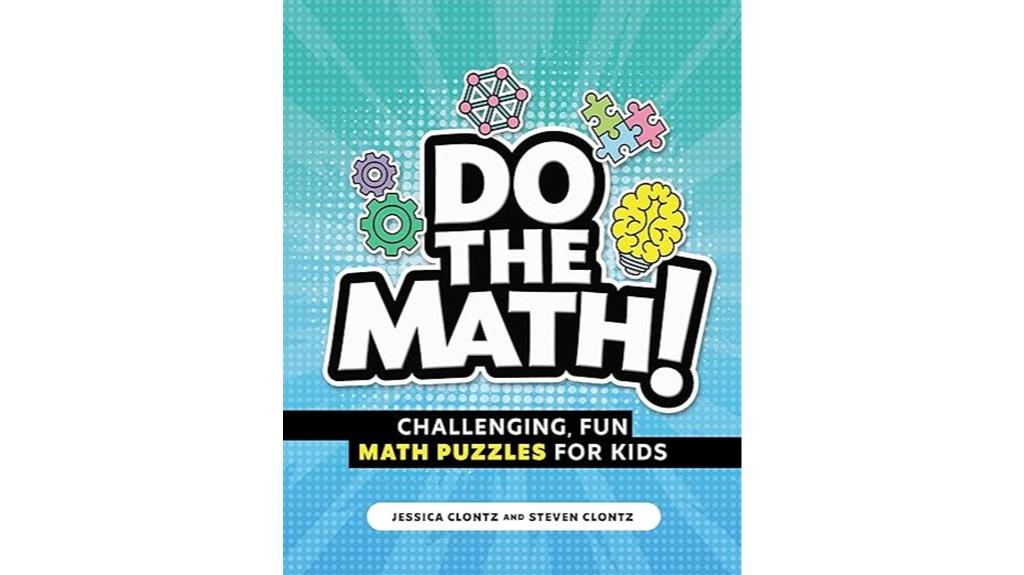
If you’re seeking a math puzzle book that truly challenges and engages motivated kids, “Do the Math!: Challenging, Fun Math Puzzles for Kids” is an excellent choice. Designed for children ages 6-12, especially those in grades 4-6 or gifted learners, it offers a variety of puzzles that boost critical thinking and problem-solving skills. The book features both straightforward and mind-bending challenges, including logic puzzles, decoding activities, and math problems. Kids love its engaging format, and educators appreciate its progression from easy warm-ups to tougher challenges. It’s a versatile resource that promotes independent learning and makes math both fun and stimulating.
Best For: Gifted children, math enthusiasts, and students in grades 4-6 seeking challenging puzzles that foster critical thinking and problem-solving skills.
Pros:
- Offers a diverse range of puzzles including math, logic, decoding, and encryption activities to keep children engaged.
- Progressively increases in difficulty, supporting skill development from warm-up to challenging problems.
- Encourages independent learning and critical thinking, making math fun and mentally stimulating.
Cons:
- Lacks answer keys, which may make self-guided learning more difficult without additional support.
- Some puzzles may be too advanced for younger children or early learners without guidance.
- Durability and presentation are satisfactory but could be improved for long-term use.
The Moscow Puzzles: 359 Mathematical Recreations
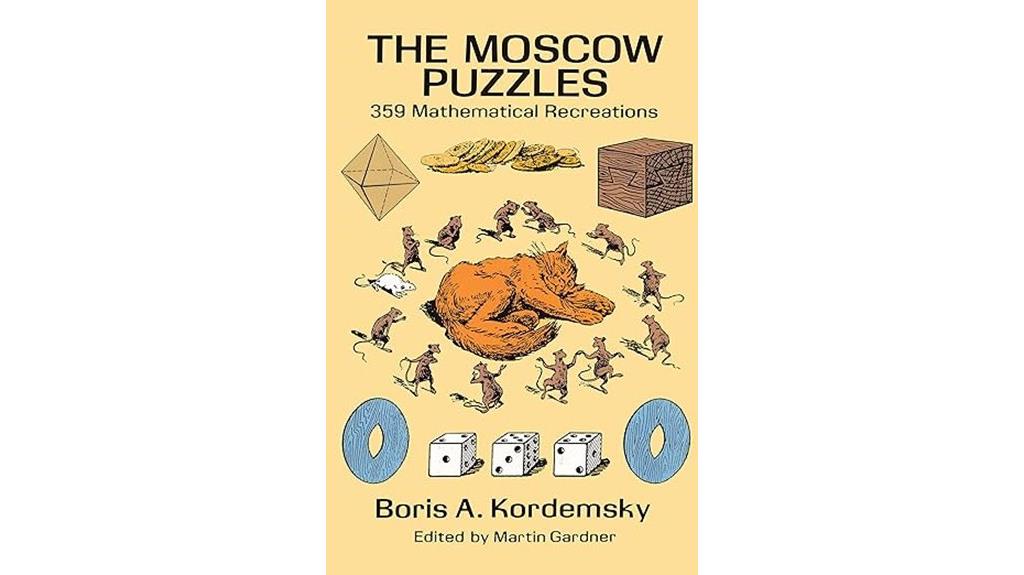
For puzzle enthusiasts who love a serious mental challenge, “The Moscow Puzzles: 359 Mathematical Recreations” stands out as an essential read. This collection offers a wide range of puzzles, from easy warm-ups to some of the toughest challenges you’ll find. It combines math riddles, logic problems, and fascinating historical anecdotes from the USSR era, making it both educational and entertaining. The puzzles often require multiple steps, resourcefulness, and visual thinking. Designed for a broad audience, it’s perfect for sharpening your reasoning skills while enjoying a nostalgic glimpse into Soviet puzzle culture. It’s a must-have for anyone enthusiastic to push their brainpower to the limit.
Best For: puzzle enthusiasts, students seeking mental challenges, and educators looking for engaging problem-solving resources.
Pros:
- Offers a diverse range of puzzles from easy to extremely difficult, catering to all skill levels.
- Combines mathematical riddles, logic problems, and historical anecdotes, making the experience both educational and entertaining.
- Stimulates analytical thinking, resourcefulness, and visual problem-solving skills in a nostalgic Soviet context.
Cons:
- Some puzzles may be quite challenging and time-consuming, requiring patience and multiple attempts.
- Minor translation issues or typos can occasionally cause confusion or misinterpretation.
- The difficulty exponentially increases in later sections, which might be overwhelming for casual puzzle solvers.
Tricky Logic Puzzles for Adults: 130+ Difficult Puzzles
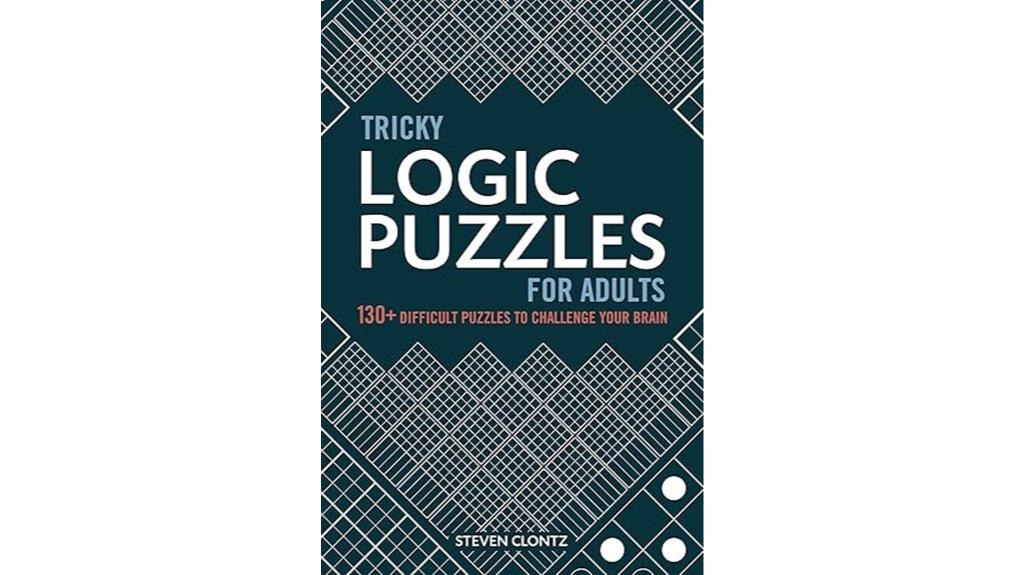
Tricky Logic Puzzles for Adults: 130+ Difficult Puzzles is an excellent choice for puzzle enthusiasts who crave a challenging mental workout that keeps their skills sharp. This book offers high-quality, durable pages with clear, colorful printing, making solving enjoyable and satisfying. It includes a wide variety of puzzles like Sudoku, Nonograms, Calcudoku, and cryptic challenges, gradually increasing in difficulty to maintain engagement. Many puzzles feature clever twists, such as finding words in solutions. With hints and an answer key, it’s accessible for different skill levels. Despite some minor flaws, the diverse, thoughtfully designed puzzles make this book a fantastic resource to boost your logic and problem-solving skills.
Best For: puzzle enthusiasts seeking a diverse, challenging, and engaging mental workout that improves their logic skills.
Pros:
- High-quality, durable pages with clear, colorful printing enhance the solving experience.
- Wide variety of puzzles, including unique twists like word-finding in solutions, cater to different interests and skill levels.
- Gradual difficulty progression and hints make it accessible and enjoyable for a broad audience.
Cons:
- Some puzzles contain errors in solutions or hints, which can cause frustration.
- Certain puzzle types, like cryptic puzzles and Masyu, may lack sufficient instructions, leading to confusion.
- The binding quality is subpar, making it less convenient for extended use or solving sessions.
Mind Matrix Logic Puzzle Book for Adults, Teens & Kids
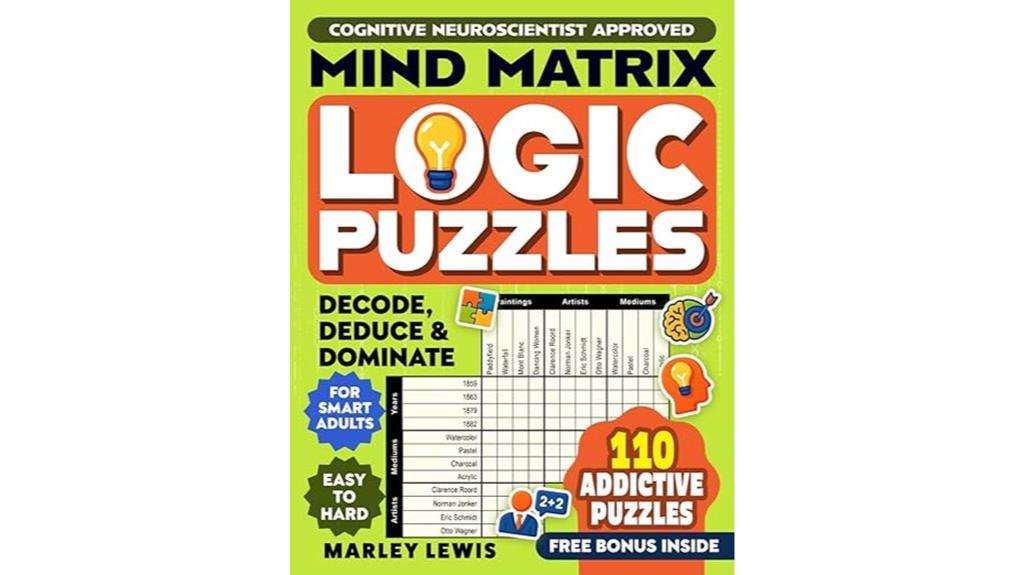
The Mind Matrix Logic Puzzle Book stands out as an excellent choice for adults, teens, and kids seeking engaging brain teasers that challenge a wide range of skill levels. It offers 110 grid puzzles designed to improve reasoning, memory, and thinking skills. The puzzles vary from simple to complex, making them accessible yet stimulating. Many users find them fun and rewarding, especially for mental recovery or cognitive development. The clean layout and variety keep motivation high. Despite some minor issues like small grids and occasional errors, I believe it’s a valuable tool for anyone looking to boost brainpower while enjoying a unique puzzle experience.
Best For: individuals of all ages seeking enjoyable and effective brain exercises to enhance reasoning, memory, and cognitive skills, including those undergoing brain recovery or looking for a fun mental challenge.
Pros:
- Offers a wide variety of puzzles with different difficulty levels suitable for all ages and skill sets
- Promotes mental sharpness, reasoning, and memory improvement through engaging gameplay
- Features a clean, user-friendly layout that makes puzzles accessible and enjoyable
Cons:
- Small grid spaces can make solving and note-taking more difficult for some users
- Occasional proofreading errors, such as misprinted sums, may cause confusion
- Limited space for notes might hinder tracking strategies or solving progress
The 125 Best Brain Teasers of All Time Book
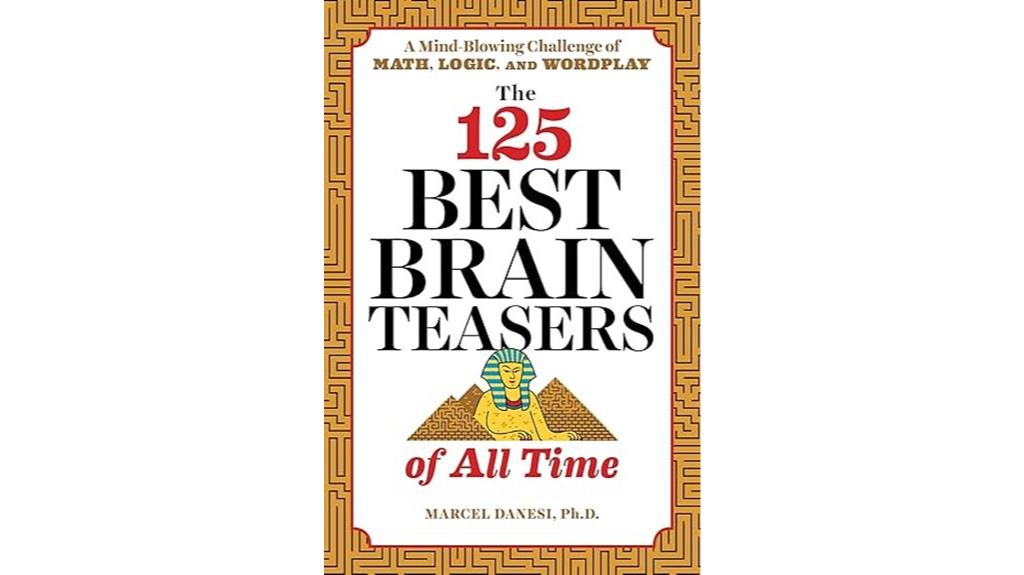
The 125 Best Brain Teasers of All Time stands out as an ideal choice for anyone looking to sharpen their mind with a wide variety of puzzles. This book offers a diverse collection of riddles, logic puzzles, wordplay, and number challenges suitable for all ages and skill levels. Whether you’re a beginner or an enthusiast, it provides engaging mental exercises that promote problem-solving and cognitive growth. The puzzles range from easy to very challenging, with clear explanations and solutions. Perfect for road trips, game nights, or relaxing before bed, it’s a fun way to distract stress and boost your brainpower.
Best For: those seeking to enhance their problem-solving skills and enjoy a wide variety of puzzles suitable for all ages and experience levels.
Pros:
- Offers a diverse mix of riddles, logic puzzles, wordplay, and number challenges for broad appeal.
- Suitable for all skill levels, from beginners to experienced puzzle enthusiasts.
- Includes clear explanations and solutions, facilitating learning and mental growth.
Cons:
- May not provide enough of a challenge for highly experienced or advanced puzzle solvers.
- The difficulty progression could be too gentle for those looking for extremely complex puzzles.
- Some users might find the puzzles too easy or less stimulating over time.
Factors to Consider When Choosing a Math Puzzle Book
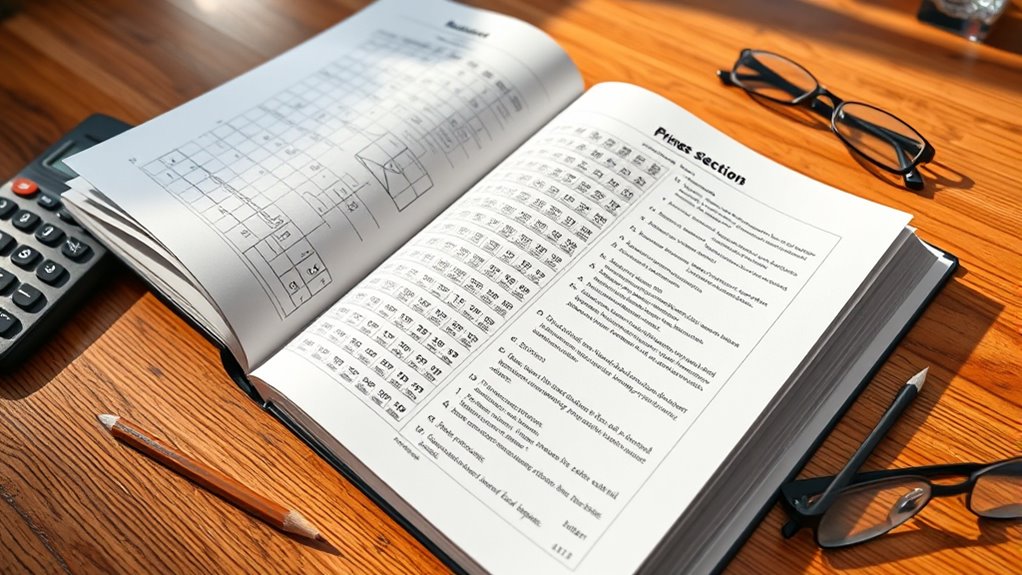
When choosing a math puzzle book, I look at factors like age appropriateness and how the difficulty level progresses to keep challenges engaging. I also consider the variety of puzzle types to guarantee there’s something fresh and educational, along with clear visuals and layout design for easy navigation. These points help me find a book that’s both fun and suited to my skill level.
Age Appropriateness
How can you guarantee a math puzzle book is just right for a child’s age? First, check if the puzzles match their developmental and cognitive level. For younger kids, look for simpler puzzles that build basic skills, while older children need more complex challenges to stay engaged. Make sure the book offers guidance or hints suited to their age—support that helps without causing frustration. The language and presentation should be engaging and easy to understand, avoiding overly advanced or overly simplistic formats. Also, ensure the difficulty progression is gradual, so challenges increase as they grow, fostering confidence without discouragement. By considering these factors, you’ll choose a book that’s both appropriate and motivating, making math fun and rewarding at every stage.
Difficulty Level Progression
Have you ever noticed how puzzles that jump abruptly in difficulty can quickly frustrate or discourage learners? That’s why a good math puzzle book should have a smooth, gradual difficulty progression. Starting with easier puzzles helps build confidence, allowing solvers to master basic concepts before moving on to more complex challenges. Clear categorization of puzzles by difficulty level makes it easier to choose appropriate challenges and track progress over time. A well-structured book balances accessible puzzles with more challenging ones, keeping motivation high and engagement steady. Sudden jumps in difficulty can cause frustration and loss of interest, so look for books that carefully increase in challenge. This steady progression ensures you stay motivated and continually develop your skills without feeling overwhelmed.
Puzzle Variety and Types
Choosing a math puzzle book that keeps your interest alive depends not just on difficulty levels but also on puzzle variety. A diverse mix of puzzles like number patterns, logic riddles, crosswords, and Sudoku offers all-encompassing mental exercise and keeps things fresh. This variety prevents boredom, especially if you’re working through puzzles over time. Including different formats also helps target various cognitive skills, from pattern recognition to reasoning and problem-solving. A good collection balances straightforward challenges with more complex puzzles, catering to different age groups and skill levels. When selecting a book, look for one that offers multiple puzzle types and difficulty ranges. This approach ensures continuous engagement and steady skill development, making your puzzle-solving journey both fun and rewarding.
Educational Value Focus
When selecting a math puzzle book with strong educational value, it’s essential to look for a variety of puzzles that foster critical thinking, pattern recognition, and problem-solving skills. The book should offer clear explanations, instructions, or hints to help learners grasp underlying concepts and strategies. Content that gradually increases in difficulty allows learners to build confidence and develop mastery over basic to advanced math reasoning. Supplementary materials like answer keys or step-by-step solutions are valuable, enabling independent learning and self-assessment. Additionally, including diverse puzzle types—such as number patterns, logic puzzles, and algebra challenges—broadens mathematical understanding and application. A well-rounded, educational-focused puzzle book not only challenges the mind but also deepens comprehension, making learning both effective and engaging.
Visual and Layout Design
A well-designed layout is essential for making a math puzzle book engaging and easy to navigate. Clear spacing and consistent formatting improve readability and help prevent frustration during problem-solving. When the font size and style are uniform, it’s easier to distinguish instructions, puzzles, and solutions quickly. Visual cues like color coding, icons, or diagrams are invaluable for clarifying complex patterns or different puzzle types, enhancing comprehension. A user-friendly interface with intuitive navigation allows me to move smoothly between sections or difficulty levels without confusion. Additionally, high-quality paper and durable binding contribute markedly to usability, especially if I plan to use the book regularly. Overall, thoughtful visual and layout design makes the experience more enjoyable and efficient, encouraging continued puzzle exploration.
Price and Quality Balance
Finding the right balance between price and quality is essential to getting the most value from a math puzzle book. You want puzzles that are engaging and well-designed, but also durable enough to withstand frequent use. Cheaper books might save you money upfront but can fall short on paper quality or puzzle variety, which impacts your learning experience. On the other hand, higher-priced options often feature better materials, a broader range of puzzles, and detailed explanations that justify the cost. To avoid disappointment, I recommend comparing reviews and sample pages to appraise quality. Striking this balance ensures you get a resource that’s both enjoyable and durable, offering challenging puzzles suited to your skill level without unnecessary spending.
Frequently Asked Questions
Which Age Group Benefits Most From These Math Puzzle Books?
You’re wondering which age group benefits most from math puzzle books. I believe these books are fantastic for all ages because they challenge the mind and improve problem-solving skills. Kids develop critical thinking early on, teenagers sharpen their logic, and adults keep their brains active. Personally, I find that anyone enthusiastic to learn and enjoy a mental workout gains the most, regardless of age, making these puzzles universally beneficial.
Are These Books Suitable for Self-Study or Classroom Use?
Think of these books as treasure chests of brainpower—perfect for self-exploration or classroom discovery. I believe they work well for self-study because they invite you to open puzzles at your own pace. Teachers can also weave them into lessons, sparking curiosity and critical thinking. Whether you’re solving solo or in a group, these books are versatile tools that turn math challenges into exciting adventures.
How Do I Select a Puzzle Book for Different Skill Levels?
When choosing a puzzle book for different skill levels, I first consider my current abilities and goals. I look for books that clearly indicate their difficulty level, from beginner to advanced. I also read reviews to make certain the puzzles are engaging yet appropriately challenging. Sometimes, I select a series that gradually increases in difficulty, so I can steadily improve without feeling overwhelmed. This approach keeps me motivated and progressing.
Can These Puzzles Improve Specific Mathematical Skills or Just General Problem-Solving?
These puzzles can definitely sharpen specific skills like logic, number sense, and pattern recognition, depending on the book’s focus. I’ve found that some collections emphasize algebra or geometry, helping me strengthen those areas. Others boost general problem-solving abilities, which are useful across math topics. So, choose a book aligned with your goals—whether to target certain skills or improve overall mathematical thinking.
Are There Any Recommended Companion Resources or Apps to Enhance Learning?
You’re asking about companion resources to boost your math puzzle learning. I recommend apps like Brilliant and Khan Academy, which offer interactive problem-solving and explanations. Additionally, websites like Art of Problem Solving provide forums and tutorials. These tools complement puzzle books by offering structured lessons and instant feedback, helping you deepen your understanding and keep you motivated. Combining these resources with puzzle books creates a well-rounded, engaging learning experience.
Conclusion
Diving into these books is like opening a treasure chest of mental gems—you never know what brilliant idea will spark next. I once struggled with a tricky pattern puzzle, but solving it felt like finding a hidden key to my brain’s secret vault. Whether you’re a kid or an adult, these puzzles challenge and delight, sharpening your thinking one problem at a time. So, grab a book and start your own adventure—your brain will thank you!

